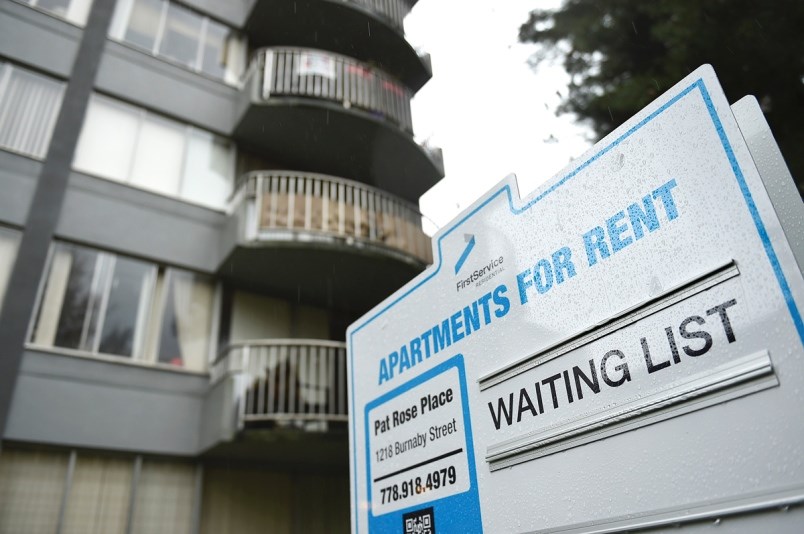Despite various measures to suppress rent increases and increase the pool of rental homes, Metro Vancouver’s vacancy rates have barely eased, and average rents are up nearly double the rent-control maximum, according to the by Canada Mortgage and Housing Corp. (CMHC) released January 15.
The overall rental vacancy rate (the percentage of overall rental units that are vacant and available) has increased only incrementally, to 1.1 per cent across Metro Vancouver, compared with 1 per cent one year previously. This makes Â鶹´«Ã½Ó³»CMA the second-tightest rental market in the country.
The dubious honour of Canada’s lowest rental vacancy rate (when comparing metropolitan areas) went to Greater Victoria, where rates have contracted further to one per cent.
That figure matches the new rental vacancy rate within the City of Vancouver, which has eased slightly from 0.8 per cent in 2018 to one per cent this year, almost entirely driven by an increase in new purpose-built rental units.
The number of condo units in the region's rental pool also increased significantly by 18.9 per cent compared with 2018, largely related to policy measures such as short-term rental restrictions, the provincial Speculation and Vacancy Tax, and the City of Vancouver’s Empty Homes Tax.
CMHC’s report said, “While there are a variety of reasons owners could convert their properties to long-term rental, the unprecedented shift in this direction in 2019 outlined in this section suggests that it is likely that these policies contributed to the increase in the number of condos available on the long-term rental market.”
Despite this new supply of condos in the rental pool, the vacancy rate in the condo-rental sector did not ease at all, meaning that all of the units that came on stream were snapped up by pent-up demand.
Eric Bond, CMHC’s senior specialist of market analysis, told Glacier Media, “What’s hard for socio-economists to quantify is the potential demand for rental. How many people living in households with roommates, or living in the parental home, or living in other cities, who would form a new rental household in this region if they could find one available within their budget? There is a lot of pent-up demand out there. All of those condo units that came on stream in 2019 found tenants, the vacancy rate did not improve.”
Burnaby saw the region’s largest decline in overall vacancy rates, dropping from two per cent to 1.3 per cent. Bond told Glacier Media, “The rental vacancy rate decreased in Burnaby in 2019, and that coincided with a year in which the universe of rental apartments also decreased by 255 units. That’s due to the number of units taking offline, because of eviction and demolition, exceeding the number of new rental units that were completed. Burnaby led the region last year in terms of condo construction, and it’s not always clear whether removals from the rental universe are in fact replaced with rental, or replaced with condos or other development.”
All this demand has resulted in average rents across the region increasing by 4.7 per cent compared with one year earlier (up 4.6 per cent in the City of Vancouver, 4.9 per cent in Burnaby and 7.7 per cent in West Vancouver). These figures are above the provincially set rent control cap of 2.5 per cent per year.
The reason average rent increases can outstrip rent control is that rent control is only applied to existing tenants, meaning landlords cannot increase a tenant’s rent by more than 2.5 per cent per year. As landlords can put rents up by any amount between tenancies, and tenancies tend to have a high turnover, average rents can easily rise by more than rent control.
Indeed, CMHC found that the average asking rent for vacant units in the region was 20.8 per cent higher than the average rent paid in currently occupied units.
Not only does rent control apparently fail to fully suppress rent increases, but many in the industry also argue that it serves to limit overall new supply by deterring landlord-developers, further contributing to tight vacancies and higher rents.
The CMHC report comes shortly after rental website Rentals.ca issued a , which said, “Rent control might be well intentioned, but it is also highly damaging to purpose-built rental feasibility. Rental developers must take into account the long-term revenue potential their projects present. Rent control, as imposed in B.C. for example, limits this long-term potential, further eroding the case to build rental over strata (condominium) units.”



